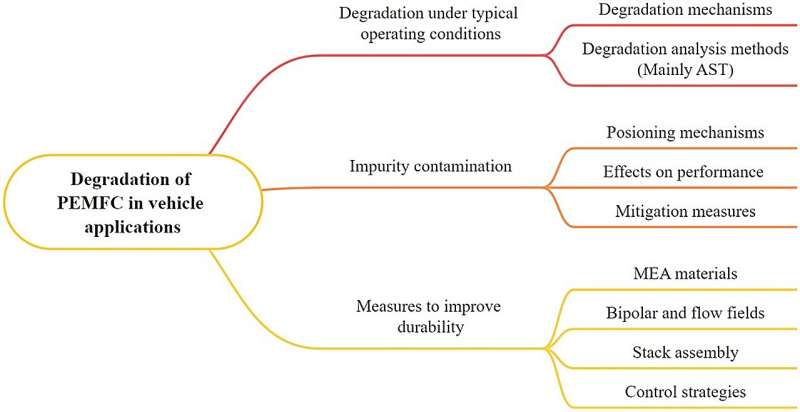This article has been reviewed according to Science X's editorial process and policies. Editors have highlighted the following attributes while ensuring the content's credibility:
fact-checked
proofread
Boosting the durability of eco-friendly cars' power source

Proton exchange membrane fuel cells (PEMFCs) stand at the forefront of clean energy solutions for vehicles, promising zero emissions, high efficiency, and minimal noise. Despite these advantages, the path to widespread adoption is obstructed by significant durability and lifespan challenges. These obstacles are primarily due to the fuel cells' vulnerability under the variable and often harsh conditions of automotive operation.
A new review published on 27 February 2024, in the journal Energy Storage and Saving, investigates the various degradation mechanisms of PEMFCs within automotive settings. It emphasizes the application of accelerated stress testing methods and offers strategies to enhance the durability of PEMFCs.
The research team conducted an in-depth examination of the obstacles PEMFCs face, ranging from the chemical breakdown of membranes due to harsh reactions and the corrosion of carbon supports crucial for maintaining cell integrity, to the mechanical wear and tear resulting from variable operational demands. Additionally, the study highlighted how impurities, often neglected, infiltrate the system and further accelerate degradation, thereby obstructing the development of durable PEMFCs.
By directly confronting these issues, the research introduces pioneering approaches, including the application of accelerated stress testing (AST) methods. These methods effectively mimic the severe conditions encountered by PEMFCs in actual automotive applications, offering a comprehensive analysis of various degradation mechanisms such as chemical, mechanical, and impurity-induced deteriorations. Suggestions on the durability improvement are also provided from multiple aspects.
Zhengkai Tu, the research team leader, states, "Understanding and mitigating the degradation of PEMFCs in vehicle applications is crucial for realizing their full potential as a sustainable energy source. Our comprehensive analysis offers new perspectives and solutions to overcome the durability challenges, bringing us closer to commercializing this clean technology."
This approach not only sheds light on the vulnerabilities of PEMFCs but also charts a course for innovating more resilient materials and designs. By tackling the Achilles' heel of PEMFCs, this research propels us closer to a future where clean, efficient, and durable fuel cells power our vehicles, marking a significant leap towards sustainable transportation.
More information: Zikuo Liu et al, Recent development in degradation mechanisms of proton exchange membrane fuel cells for vehicle applications: problems, progress, and perspectives, Energy Storage and Saving (2024). DOI: 10.1016/j.enss.2024.02.005















